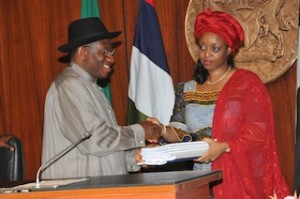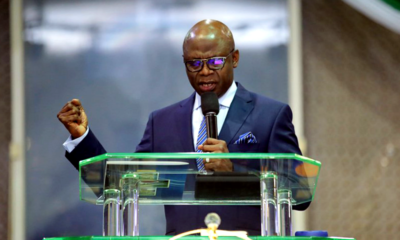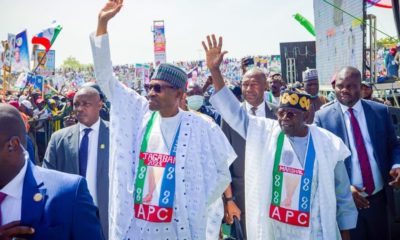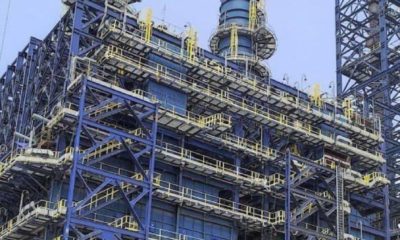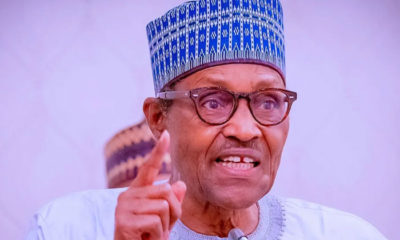Finance
President Buhari to probe Jonathan, Diezani over $6.9m campaign stages
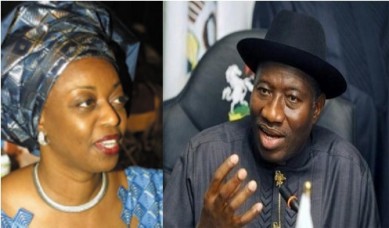
ABUJA-THE ongoing probe of the immediate past administration by President Muhammadu Buhari is to beam its searchlight on the alleged purchase of three mobile stages, costing $6.9m, by former President Goodluck Jonathan and two of his officials, a Presidency source has said.
According to a document, which was obtained from the Presidency on Saturday, the deal, which is now a subject of investigation, was allegedly carried out by Jonathan; his Chief Security Officer, Mr. Gordon Obuah; and former Minister of Petroleum, Mrs. Diezani Alison-Madueke.
The fund was said to have been withdrawn from one of the numerous accounts of the Nigerian National Petroleum Corporation.
The $6.9m (about N1.37bn) was said to have been withdrawn for the purpose of buying three pieces of 40-feet mobile stages for use by Jonathan during mass public speaking events.
According to the document, apart from the fact that the sum for the stages was “incredibly inflated”, there is currently no evidence that the stages were bought since the money was withdrawn.
The document read, “While the cost of mobile stages ranges in sizes and designs, only outlandish rock star musicians in Europe and the US spend hundreds of thousands on their huge stages way bigger than the 40-feet stages.
“Even then, those musicians and superstars would not pay over $2m per stage, according to industry sources.
“The process of procurement of the three mobile stages was neither known to extant Nigerian laws and due process regulations nor were the offices of the Auditor-General and the Accountant-General in the know, according to the investigators.”
It added that the phony purchase was carried out late 2011, a few months after Jonathan won the presidential election for a full term after having completed the term of the late President Umaru Yar’Adua.
Jonathan’s CSO was said to have initiated a memo to the former President on October 17, 2011, asking for the purchase of three mobile stages.
He was reported to have written in that memo to Jonathan that memo referred to “my earlier discussion with Your Excellency on the security implication of your public appearances and your subsequent directive on the need to procure a secured presidential platform.”
The Presidency source said on the same day, without any financial advice or purchase order reviews, the former President approved the request to buy the three stages and minuted the memo to the then Minister for Petroleum Resources.
In his minute, Jonathan was said to have written, “We have discussed this, please deal.”
According to the document, on the same October 17, the Senior Special Assistant to the President on Administrative Matters, Mr. Matt Aikhionbere, did another letter on the strength of the President’s approval requesting the minister to take action on the request to purchase the stages for $6.9m.
It added, “By the next month, an NNPC payment voucher, number 3840336, was already in place, revealing that the money was released.
“NNPC directed that the money be taken from one of its accounts in New York CITIBANK with sort code CITIUS 33, and Routing number 021000089.
“It was first routed from the US bank to an NNPC account in Zenith Bank account number 5000026593, Maitama branch in Abuja, from where the money was sent to a private account.
“The sum of $6.9m was then credited to a Sterling Bank account of one J. Marine Logistics Limited, Abuja, a company investigators said was registered by Obuah.
“The CSO himself, according to investigators, has not been able to show proof of the purchase and his memo irked his bosses at the SSS that he took the initiative to write requesting for the stages, an action which officials said was way above his pay grade.”
The document added that it was not the duty or responsibility of the CSO to make the determination on that purchase as he was meant to have informed the service, which will then review the situation and act accordingly.
It added that the $6.9miilion in question was promptly paid on Nov. 29, 2011 into a private account belonging to the former CSO.
“The former President approved the procurement of the mobile platforms without due process and bypassing the Procurement Act; neither was there an appropriation in the 2011 budget for such facility,” the document quoted investigators as saying.
It added that neither the then Minister of Finance nor the Director-General of the Budget Office was aware of the deal.
“Investigators say this is just one of the several instances, where the Jonathan administration used secret NNPC accounts to fund many questionable projects and for alleged personal financial aggrandisement.
“Already, the CSO has been questioned over his role and activities in the Jonathan Presidency. It will be recalled that he was arrested, detained, questioned and later released.
Attempts to get the National Publicity Secretary of the Peoples Democratic Party, Chief Olisa Metuh, to react to the allegation against the former President did not succeed as calls to his mobile telephone did not go through.
He had yet to respond to an SMS sent to his mobile phone as of the time of filing this report.
PUNCH-
Banking
CBN Denies Currency Devaluation

The Central Bank of Nigeria (CBN) has refuted claims of devaluing the.
Earlier reports suggested that the CBN had devalued the Naira, lowering its exchange rate from N631 to the dollar, compared to the previous day’s rate of N461.60 at the Importers and Exporters (I&E) window.
However, the Central Bank of Nigeria (CBN) released a statement on Thursday through its Acting Head of Corporate Communications, Dr. Isa Abdulmumin, categorizing the report as false information.
In the statement titled ‘CBN Has Not Devalued The Naira’, he said the attention of the apex bank was drawn to the news report by an Abuja based newspaper edition of June 1, 2023, titled “CB Devalues Naira To 630/51”.
However, the CBN stated categorically that the news report was replete with outright FALSEHOODS and destabilizing innuendos, ‘reflecting potentially willful ignorance of the said medium as to the workings of the Nigerian Foreign Exchange Market.’
“For the avoidance of doubt, the exchange rate at the Investors’ & Exporters (I&E) window traded this morning (June 1, 2023) at N465/USS1 and has been stable around this rate for a while.
“The public is hereby advised to ignore the news report by Daily Trust in its entirety, as it is speculative and calculated at causing panic in the market,” the CBN spokesman added.
He, therefore, advised media practitioners to verify their facts from the Central Bank of Nigeria before publishing in order not to misinform the public.
Banking
BREAKING: CBN Increases Interest Rate By 0.5%

The interest rate in Nigeria has been raised to 18.5 percent, up by 0.5 percent, from 18 percent where it was pegged in March 2023.
The Central Banks of Nigeria’s (CBN) Monetary Policy Committee (MPC) resolved to this effect at its third meeting of 2023 in Abuja, on Wednesday.
Governor, CBN, Godwin Emefiele, made the disclosure in the communiqué of the MPC’s meeting, thereafter.
While engaging the media at the end of the two-day meeting, Emefiele, said the committee voted to keep the asymmetric corridor at +100 and -700 basis points around the MPR.
In the view of the MPC, rising inflation rate is traceable to the high energy cost and challenges around the supply chain, among others, which lie outside the corridors of the CBN.
Emefiele said, “The current trend in price development would continue to be monitored by the bank with greater collaboration with fiscal authority to address the drivers of inflation.”
Biztellers reports that the CBN had effected six consecutive interest rate increases, which has seen the rate move from 11.5 percent in March 2022 to 18.5 percent in May 2023.
Finance
Dangers Lurk As Nigerians Resort To Refurbished Gas Cylinders

In Nigeria, people have been forced to come up with creative solutions to cope with the effects of inflation and the economic crisis.
These improvised strategies have not only helped individuals save money, but also enabled them to stay afloat during difficult times.
In a concerning development, the recent trend of boycotting the high cost of cooking gas cylinders in Nigeria may pose a greater risk to lives than it does in terms of saving money.
Economy&Lifestyle investigations have revealed that the soaring prices of gas cylinders have reached a point where it has become increasingly challenging for average households to afford them, let alone refill them with gas.
The situation is further exacerbated by the fact that the pump price of kerosene, which would typically serve as an alternative, has become prohibitively expensive.
Upon investigation, it was found that the prices of gas cylinders vary depending on their sizes. A 3kg gas cylinder is priced at N14,000, while a 5kg cylinder costs N16,000. The larger cylinders are even more costly, with a 6kg cylinder priced at N17,000 and a 12.5kg cylinder costing N19,000.
Additionally, the expense continues when it comes to filling these cylinders with cooking gas, as it costs N2,600 for a 3kg cylinder, N5,200 for a 6kg cylinder, N8,950 for a 10.5kg cylinder, and N10,650 for a 12.5kg cylinder.
Consequently, an average household that needs to replace a worn-out 5kg cylinder would have to come up with N20,250 to purchase a new cylinder and fill it with gas, which can be a difficult feat to achieve.
As a result, many people have resorted to refurbishing their old cylinders and trying to use them as best as they can. However, this approach poses a significant danger.
Mrs. Rukayat Adesoji, a trader, shared her experience regarding her gas cylinder, which had become rusted and could no longer stand upright since last month. Due to the exorbitant prices of purchasing new cylinders, she resorted to seeking the assistance of a welder.
The welder patched the legs of the cylinder, repainted it, and ever since then, she has been using the refurbished cylinder for her cooking needs.
She said ““My gas cylinder which was 6kg got rusted and no longer stands erect since last month. When I asked for the price, I was told it was N17, 500. I was discussing it with a friend who advised me to take it to a welder to paint it and construct a new stand. I heeded to her advice and at the end spent just N3, 000 to turn my cooking gas to a brand new.”
Apart from refurbishing cylinders, some people don’t even know when their cylinders will expire. Mrs. Mercy Opara, a hair stylist, falls in that category as she explained: “I am taking my gas cylinder to the welder to spray it for me. It just cost N1, 500.
“The cost of buying a new cylinder is high. I have been using my cylinder for over 7 years and I don’t even know the expiry date. I just pray God blesses me so that I can buy a new one. But this one I am managing will look neat after spraying it for another two years.”
Mr. Adekanbi Joseph, a wielder, said he paints cylinder and “To paint and rebuild a cylinder stand, I charge N4, 500. Many people come here to paint as a new cylinder is now very expensive to get.”
Highlighting the potential dangers of using refurbished cylinders, Mr. Benjamin Hope, the Chief Executive Officer of FKT Cooking gas and general goods, emphasized the risks involved.
He stated that even a brand new cylinder can pose a risk of explosion if the locks are not properly secured after use or if the cylinder filled with gas is moved from one location to another.
He said “A brand new cylinder can explode if the locks are not well keyed after using and if the cylinder filled with gas was moved from one place.
“There are many reasons for the high cost of gas cylinders in Nigeria. One is the cost of importation due to the exchange rate. Another is the increased migration from the use of kerosene to cooking gas which has necessitated increased demand for gas cylinders. You know that in such a case there will be increased importation of cylinders.”he added

